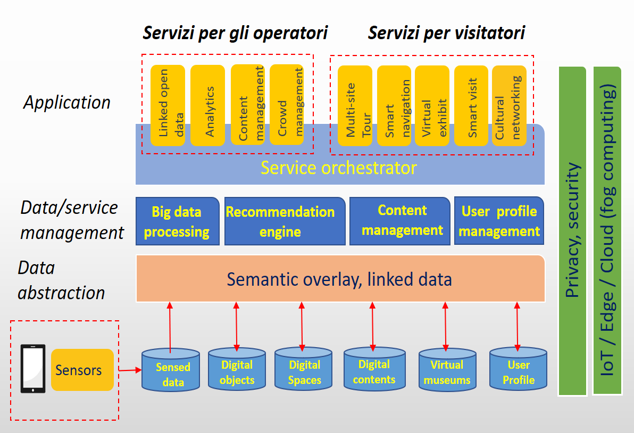Research Projects
BeT : Behavior-enabled IoT (2023-2025)
Title: Behavior-enabled IoT (BeT)
Main topics:Behavior-enabled Computing, Human-in-the-loop, AI and IoT
Start Date: 28/09/2023, End Date: 27/09/2025
Units: University of L'Aquila (PI), University of Sannio, Free University of Bozen-Bolzano, Italy
Participants from FrAmeLab: Henry Muccini (PI), Dr. Moamin Abughazala, Dr. Roberta Capuano, Rafiullah Omar
General Goal:
BeT sees a future where humans and computational elements work together through AI and machine learning algorithms to satisfy personalized and collective goals. In this vision, humans and cyber-physical entities can move in a shared environment, each impacting the behavior of the other. This implies a bi-causal connection between humans and software systems, where both software and human behavior can be adapted to follow expectations and actions for optimal Quality of Service and Quality of Experience.
Context and Motivation:
Contact: henry.muccini (at) univaq.it
VASARI : Italian Smart Art Experience (2018-2022)
Title: Italian Smart Art Experience (VASARI)
Main topics:ICT for Cultural Heritage, Smart Art Experience, Valorization of the artistic heritage.
Start Date:01/09/2018, End Date: 28/02/2022
Official Website:https://www.vasariartexperience.it/#
Units:SANTER REPLY SpA, @CULT Srl, ILLOGIC Srl, HERITAGE Srl, Officina Rambaldi Srl, Risorse Srl, Università degli Studi di Milano, Università degli Studi di Salerno, Università degli Studi del Molise, DATABENC SCaRL, Consorzio Interuniversitario Nazionale per l’Informatica (CINI) (including UnivAQ)
Participants from FrAmeLab: Prof. Henry Muccini (unit leader), K. Vaidhyanathan, M. Moghaddam, M. Sharaf, M. Abughazala
General Goal:
Enhancing the visitor experience within Italy's rich artistic and archaeological heritage
Context and Motivation:
This project addresses the challenge of enhancing the visitor experience within Italy's rich artistic and archaeological heritage. Traditionally, interactions with these cultural treasures have been largely passive, limited to viewing works of art or exploring sites without a deep understanding of their historical context. Our initiative aims to transform this experience by providing a more immersive and informative exploration that goes beyond mere observation. By rethinking how artistic and archaeological assets are presented, we seek to enable visitors to engage more fully with Italy's cultural heritage, making the historical and artistic narratives accessible and engaging for all, regardless of individual abilities.

VASARI's architectural design has been carefully crafted to cater to the needs of both operators and visitors alike, utilizing the latest technologies and architectural paradigms to ensure seamless scalability. It has been designed with scalability as a primary objective, enabling it to adapt and grow as per the users' requirements.
Contact: henry.muccini (at) univaq.it
Gallerie degli Uffizi (2016-2020)
Title: Progetto UnivAQ – Gallerie degli Uffizi
Main topics:ICT for Cultural Heritage, Visitors' flow management,
Start Date: 01/01/2016, End Date: 01/03/2021
Participation: Prof. Henry Muccini (PI), Francesco Tarquini, Gianluca Scatena. With Mohammad Sharaf, M. Moghaddam, K. Vaidhyanathan, M. Abughazala, R. Capuano.
General Goal:
Managing visitor flows to the Uffizi, which include analyzing factors contributing to queues, studying socio-cultural dynamics of visitor flows, and establishing a hardware and software infrastructure for data collection
Context and Motivation:
In a collaborative effort initiated on June 20, 2016, the Uffizi Galleries and the University of L'Aquila embarked on a project to enhance the integration of research, education, and the management of artistic heritage, focusing on improving visitor experiences through advanced technology.

Over two years, a multidisciplinary team with expertise in System Architecture, Big Data and Analytics, Statistics, Operational Research, IoT and Sensor Networks, and Mobile Computing, developed a comprehensive solution to address managing visitor flows to the Uffizi. This included analyzing factors contributing to queues, studying socio-cultural dynamics of visitor flows, and establishing a hardware and software infrastructure for data collection. The team devised the UnivAQ flow management model, which integrates statistical analysis, optimization, and adaptive machine learning to optimize visitor entry times. This approach was validated during two real-world trials in October and November 2018, achieving significant reductions in waiting times and efficiently managing high visitor volumes. The success of this initiative has led to the development of a mobile app for the Uffizi, plans for daily application of the model, and considerations for extending the system to multiple museums. This project also inspired the creation of nExpecto, an innovative start-up by the University of L'Aquila, marking a significant step forward in the application of technology to cultural heritage management.
Contact: henry.muccini (at) univaq.it
Publication:
Internationalization Projects
EDISS: Erasmus Mundus Joint Master Degree Programme on the Engineering of Data-intensive Intelligent Software Systems
Title: EDISS – Erasmus Mundus Joint Master Degree Programme on the Engineering of Data-intensive Intelligent Software Systems
Main topics:Education, Data-Intensive systems, software engineering of ML-enabled systems
Start Date: 01/07/2020, End Date:01/07/2026
Official Website: https://www.master-ediss.eu/
Units: Åbo Akademi University, Finland (PI), University of L'Aquila, Vrije Universitieit Amsterdam
Participants from FrAmeLab: Henry Muccini
General Goal:
EDISS intends to bring together software engineering educators working in data collection, data-driven assessment, and decision-making for both design- and runtime and software engineers, architects and data scientists working on data pipelines, data architectures, DataOps and in experimentation systems. We expect that such synergy will lead to sharing knowledge and expertise, and thus create new ideas and impactful solutions.
EDISS will educate experts who can masterfully integrate data science and ML solutions into software and system engineering processes.
Contact: henry.muccini (at) univaq.it
SE4GD: Erasmus Mundus M.Sc. programme Software Engineers For Green Deal
Title: SE4GD – Erasmus Mundus M.Sc. programme Software Engineers for Green Deal
Main topics:Education, Green Deal, Sustainable Software Engineering
Start Date: 01/07/2020, End Date:01/07/2026
Official Website: https://se4gd.lutsoftware.com/
Units: LUT University Finland, University of L'Aquila, Vrije Universiteit Amsterdam
Participants from FrAmeLab: Henry Muccini
General Goal:
The SE4GreenDeal Programme educates experts to innovate, design, and implement software-based solutions with sustainable effect in mind for local and global sustainability challenges. Our graduates will have an impact on individuals, societies, industries and governments through new responsible ways of developing systems.

Contact: henry.muccini (at) univaq.it
